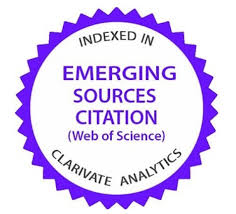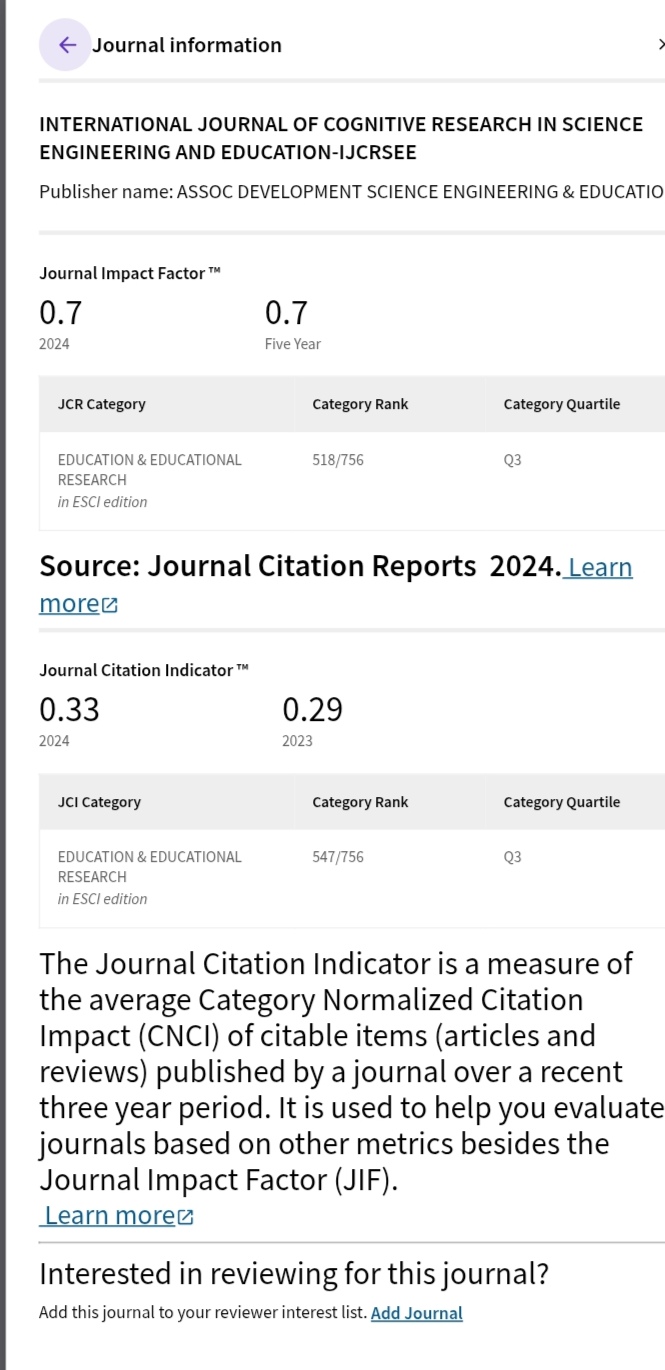Digital Competencies in the Context of Preschool Music Education
DOI:
https://doi.org/10.23947/2334-8496-2022-10-2-77-87Keywords:
digital competencies, music preschool education, Information and Communications Technology (ICT), Technological pedagogical content knowledge (TPACK)Abstract
Given the digitalization of modern society and the way a child acquires musical experiences, practitioners are expected to apply various media in everyday educational praxis. The theoretical framework of technological pedagogical content knowledge (TPACK) is an approach that connects the knowledge of educators with Information and Communications Technology (ICT), concurrently developing technology-supported pedagogical knowledge and integration of technology into education. The paper aims to investigate educators’ self-assessment of their digital competencies and their implementation in musical activities with preschool children. The respondents are full-time and part-time graduate students of the Early Childhood and Preschool Education study program from faculties of teacher education in Croatia. The obtained results indicate that 91,1 % of respondents didn’t have any formal ICT education while 59,5 % didn’t have any additional type of music education except during their studies. Nevertheless, the greatest knowledge participants have shown on the competencies for using digital tools (CFUDT) scale succeeded by a technological knowledge (TK) scale of the adapted TPACK-TCCMA survey, thus the respondents rated their digital and ICT competencies exceedingly high unlike music and pedagogical competencies. Considering the results obtained, it can be concluded that additional attention should be given to the development of digital, music, and pedagogical competencies during studies that will be applicable in both music and other areas of education.
Downloads
References
Angeli, C., & Valanides, N. (2009). Epistemological and methodological issues for the conceptualization, development, and assessment of ICT-TPCK: Advances in technological pedagogical content knowledge (TPCK). Computers & Education, 52, 154-168. https://doi.org/10.1016/j.compedu.2008.07.006 DOI: https://doi.org/10.1016/j.compedu.2008.07.006
Bauer, W. I., Reese, S., & McAllister, P. A. (2003). Transforming music teaching via technology: The role of professional development. Journal of Research in Music Education, 51(4), 289-301. https://doi.org/10.2307/3345656 DOI: https://doi.org/10.2307/3345656
Belland, B. R. (2009). Using the theory of habitus to move beyond the study of barriers to technology integration. Computers & Education, 52(2), 353-364. https://doi.org/10.1016/j.compedu.2008.09.004 DOI: https://doi.org/10.1016/j.compedu.2008.09.004
Bingimlas, K. A. (2009). Barriers to the Successful Integration of ICT in Teaching and Learning: A Review of Literature. Eurosia Journal of Mathematics, Science and Technology Education, 5(3), 235-245. https://doi.org/10.12973/ejmste/75275 DOI: https://doi.org/10.12973/ejmste/75275
Brinkerhoff, R. O. (2006). Telling training’s story. San Francisco, CA: Berrett-Koehler.
Bullock, E. P., Shumway, J. F., Watts, C. M. & Moyer-Packenham, P. S. (2017). Affordance access matters: Preschool children’s learning progressions while interacting with touch-screen mathematics apps. Technology, Knowledge and Learning, 22(3), 485-511. https://doi.org/10.1007/s10758-017-9312-5 DOI: https://doi.org/10.1007/s10758-017-9312-5
Chai, C.-S., Koh, J. H.-L., & Tsai, C.-C. (2013). A Review of Technological Pedagogical Content Knowledge. Journal of Educational Technology & Society, 16(2), 31-51. Retreived from https://www.jstor.org/stable/jeductechsoci.16.2.31
Chaudron, S. (2015). Young Children (0-8) and digital technology: A qualitative exploratory study across seven countries. Luxembourg: Publications Office of the European Union.
Chen, F.-H., Looi, C.-K., & Chen, W. (2009). Integrating technology in the classroom: A visual conceptualization of teachers’ knowledge, goals and beliefs. Journal of Computer Assisted Learning, 25(5), 470-488. https://doi.org/10.1111/j.1365-2729.2009.00323.x DOI: https://doi.org/10.1111/j.1365-2729.2009.00323.x
Common Sense Media. (2017). The Common Sense Census: Media Use by Kids Age Zero to Eight. Retrieved February 20, 2022, Retreived from https://www.commonsensemedia.org/sites/default/files/research/report/csm_zerotoeight_fullreport_release_2.pdf
Dogan, S., Dogan, N. A., & Celik, I. (2021). Teachers’ Skills to integrate Technology in Education: Two path models explaining instructional and application software use. Education and Information Technologies, 26, 1311-1332. https://doi.org/10.1007/s10639-020-10310-4 DOI: https://doi.org/10.1007/s10639-020-10310-4
Herodotou, C. (2018). Mobile games and science learning: A comparative study of 4 and 5 years old playing the game Angry Birds. British Journal of Educational Technology, 49(1), 6-16. https://doi.org/10.1111/bjet.12546 DOI: https://doi.org/10.1111/bjet.12546
Hew, K. F., & Brush, T. (2007). Integrating Technology into K-12 Teaching and Learning: Current Knowledge Gaps and Recommendations for Future Research. Education Technology Research and Development, 55, 223-252. https://doi.org/10.1007/s11423-006-9022-5 DOI: https://doi.org/10.1007/s11423-006-9022-5
Hsu, C.-Y., Liang, J.-C., Chai, C.-S. & Tsai, C.-C. (2014). Exploring Preschool Techers’ Technological Pedagogical Content Knowledge of Educational Games. Journal of Educational Computing Research, 49(4), 461-479. https://doi.org/10.2190/ec.49.4.c DOI: https://doi.org/10.2190/EC.49.4.c
Hsu, C.-Y., Tsai, C.-C. & Liang, J.-C. (2011). Facilitating Preschoolers’ Scientific Knowledge Construction via Computer Games Regarding Light and Shadow: The Effect of the Prediction-Observation-Explanation (POE) Strategy. Journal of Science Education and Technology, 20(5), 482-493. https://doi.org/10.1007/s10956-011-9298-z DOI: https://doi.org/10.1007/s10956-011-9298-z
Hsu, L., & Chen, Y.-J. (2018). Teachers’ Knowledge and Competence in the Digital Age: Descriptive Research within the TPACK Framework. International Journal of Information and Education Technology, 8(6), 455-458. https://doi: 10.18178/ijiet.2018.8.6.1081 DOI: https://doi.org/10.18178/ijiet.2018.8.6.1081
Ilari, B., & Gluschankof, C. (2009). Music in the early years: Research, theory and practice [Editorial]. Early Child Development and Care, 179(6), 685-693. https://doi.org/10.1080/03004430902944171 DOI: https://doi.org/10.1080/03004430902944171
Inan, F., & Lowther, D. (2010). Factors affecting technology integration in K-12 classrooms: A path model. Educational Technology Research and Development, 58(2), 137-154. https://doi.org/10.1007/s11423-009-9132-y DOI: https://doi.org/10.1007/s11423-009-9132-y
International Society for Technology in Education. [ISTE]. (2014). The ISTE Standards for Teachers. Retrieved February 20, 2022, Retrieved from http://www.iste.org/docs/pdfs/20-14_ISTE_Standards-T_PDF.pdf
Jimoyiannis, A. (2010). Designing and implementing an integrated technological pedagogical science knowledge framework for science teachers’ professional development. Computers & Education, 55(3), 1259-1269. https://doi.org/10.1016/j.compedu.2010.05.022 DOI: https://doi.org/10.1016/j.compedu.2010.05.022
Kabakçi Yurdakul, I. & Çoklar, A. N. (2014). Modeling Preservice Teachers’ TPACK Competencies Based on ICT Usage. Journal of Computer Assisted Learning, 30(4), 363-376. https://doi.org/10.1111/jcal.12049 DOI: https://doi.org/10.1111/jcal.12049
Kabakçi Yurdakul, I., Odabasi, H. F., Kilicer, K., Çoklar, A. N., Birinci, G. & Kurt, A. A. (2012). The development, validity and reliability of TPACK-deep: A technological pedagogical content knowledge scale. Computers & Education, 58(3), 964-977. https://doi.org/10.1016/j.compedu.2011.10.012 DOI: https://doi.org/10.1016/j.compedu.2011.10.012
Karaca F., Can, G. & Yildirim, S. (2013). A path model for technology integration into elementary school settings in Turkey. Computers & Education, 68(1), 353-365. https://doi.org/10.1016/j.compedu.2013.05.017 DOI: https://doi.org/10.1016/j.compedu.2013.05.017
Lave, J., & Wenger, E. (1991). Situated learning: Legitimate peripheral participation. Cambridge: Cambridge University Press. https://doi.org/10.1017/cbo9780511815355 DOI: https://doi.org/10.1017/CBO9780511815355
Lee, M.-H., & Tsai, C.-C. (2010). Exploring Teachers’ Perceived Self Efficacy and Technological Pedagogical Content Knowledge with Respect to Educational Use of the World Wide Web. Instructional Science: An International Journal of the Learning Sciences, 38(1), 1-21. https://doi.org/10.1007/s11251-008-9075-4 DOI: https://doi.org/10.1007/s11251-008-9075-4
Li, H. (2006). Integrating information and communication technologies into early childhood curriculum: Chinese principals’ views of the challenges and opportunities. Early Education & Development, 17(3), 467-487. https://doi.org/10.1207/s15566935eed1703_7 DOI: https://doi.org/10.1207/s15566935eed1703_7
Liang, J.-C., Chai, C. S., Koh, J. H. L., Yang, C.-J., & Tsai, C.-C. (2013). Surveying in-service preschool teachers’ technological pedagogical content knowledge. Australasian Journal of Educational Technology, 29(4), 581-594. https://doi.org/10.14742/ajet.299 DOI: https://doi.org/10.14742/ajet.299
Lum, C.-H., & Shehan Campbell, P. (2007). The Sonic Surrounds of an Elementary School. Journal of Research in Music Education, 55(1), 31-47. https://doi.org/10.1177/002242940705500104 DOI: https://doi.org/10.1177/002242940705500104
Mantilla, A., & Edwards, S. (2019). Digital technology use by and with young children: A systematic review for the Statement on Young Children and Digital Technologies. Australasian Journal of Early Childhood, 44(2), 182-195. https://doi.org/10.1177/1836939119832744 DOI: https://doi.org/10.1177/1836939119832744
Marino, M., Sameshima, P., & Beecher, C. (2009). Enhancing TPACK with Assistive Technology: Promoting Inclusive Practices in Pre-service Teacher Education. Contemporary Issues in Technology and Teacher Education, 9(2), 186-207. https://www.learntechlib.org/primary/p/30279/
McKinnon, I. (2005). Children’s music journey: the development of an interactive software solution for early childhood music education. Computers in Entertainment, 3(4), 1-10. https://doi.org/10.1145/1095534.1095547 DOI: https://doi.org/10.1145/1095534.1095547
McPake, J., Plowman, L., & Stephen, C. (2013). Pre-school children creating and communicating with digital technologies in the home. British Journal of Educational Technology, 44(3), 421–431. https://doi.org/10.1111/j.1467-8535.2012.01323.x DOI: https://doi.org/10.1111/j.1467-8535.2012.01323.x
Ministry of Science and Education of the Republic of Croatia [MSE]. (2011). Nacionalni okvirni kurikulum za predškolski odgoj i obrazovanje te opće obvezno i srednjoškolsko obrazovanje [National framework curriculum for preschool education and general compulsory and high school education]. Zagreb: Ministarstvo znanosti, obrazovanja i sporta.
Ministry of Science and Education of the Republic of Croatia [MSE]. (2014). Nacionalni kurikulum za rani predškolski odgoj i obrazovanje [National curriculum for early preschool education]. Zagreb: Ministarstvo znanosti, obrazovanja i sporta.
Mishra, P., & Koehler, M. J. (2006). Technological Pedagogical Content Knowledge: A Framework for Teacher Knowledge. Teachers College Record, 108(6), 1017–1054. https://doi.org/10.1111/j.1467-9620.2006.00684.x DOI: https://doi.org/10.1111/j.1467-9620.2006.00684.x
National Council for Accreditation of Teacher Education [NCATE]. (2008). Professional Standards for the Accreditation of Teacher preparation Institutions. Retrieved February 20, 2022, https://files.eric.ed.gov/fulltext/ED502043.pdf
O’Neill, S. A. (2012). Becoming a music learner: Towards a theory of transformative music engagement. In McPherson, G. E., & Welch, G. (Eds.), The Oxford handbook of music education (Vol. 1, Pp. 163-186). New York: Oxford University Press. https://doi.org/10.1093/oxfordhb/9780199730810.013.0010_update_001 DOI: https://doi.org/10.1093/oxfordhb/9780199730810.013.0010_update_001
Ofcom. (2017). Public Service Broadcasting Annual Research Report. London: Ofcom.
Panagiotakou, C., & Pange, J. (2010). The use of ICT in preschool music education. Procedia Social and Behavioral Sciences, 2(2), 3055-3059. https://doi.org/10.1016/j.sbspro.2010.03.464 DOI: https://doi.org/10.1016/j.sbspro.2010.03.464
Parra-Damborenea, J. (2014). Reactblocks: A 3D tangible interface for music learning. Master thesis, University of Pompeu Fabra. Retrieved February 21, 2022, http://mtg.upf.edu/node/3085
Paule-Ruiz, M. D. P., Álvarez-García, V., Pérez-Pérez, J. R., Álvarez-Sierra, M., & Trespalacios-Menéndez, F. (2017). Music learning in preschool with mobile devices. Behaviour & Information Technology, 36(1), 95-111, https://doi.org/10.1080/0144929X.2016.1198421 DOI: https://doi.org/10.1080/0144929X.2016.1198421
Ralph, R. & Petrina, S. (2018). Social learning with mobile devices in preschool classrooms. European Journal of STEM Education, 3(3), 12. https://doi.org/10.20897/ejsteme/3872 DOI: https://doi.org/10.20897/ejsteme/3872
Riley, P. (2013). Teaching, Learning, and Living with iPads. Music Educators Journal, 100(1), 81–86. https://doi.org/10.1177/0027432113489152 DOI: https://doi.org/10.1177/0027432113489152
Rose, D. H., & Meyer, A. (2002). Teaching Every Student in the Digital Age: Universal Design for Learning. Alexandria, VA: Association for Supervision and Curriculum Development.
Santos, J. M., & Castro, R. D. R. (2021). Technological Pedagogical Content Knowledge (TPACK) in action: Application of learning in the classroom by pre-service teachers (PST). Social Sciences & Humanities Open, 3(1), 100110. https://doi.org/10.1016/j.ssaho.2021.100110 DOI: https://doi.org/10.1016/j.ssaho.2021.100110
Savage, J. (2007). Reconstructing Music Education through ICT. Research in Education, 78(1), 65–77. https://doi.org/10.7227/rie.78.6 DOI: https://doi.org/10.7227/RIE.78.6
Scherer, R., Siddiq, F., & Tondeur, J. (2019). The technology acceptance model (TAM): A meta-analytic structural equation modeling approach to explaining teachers’ adoption of digital technology in education. Computers & Education, 128, 13–35. https://doi.org/10.1016/j.compedu.2018.09.009 DOI: https://doi.org/10.1016/j.compedu.2018.09.009
Shehan Campbell, P., & Lum, C.-H. (2007). Live and Mediated Music meant just for Children. In Smithrim, K. & Upitis, R. (Eds.), Listen to their voices: Research and practice in early childhood music (pp. 319-329). Waterloo, ON: Canadian Music Educators’ Association.
Shillady, A., & Parikh, M. (2012). Technology and young children. New tools and strategies for teachers and learners. Young Children, 67(3), 10-13. Retrieved from https://www.proquest.com/openview/4f4066e4559ac159d29205f758e7c5fe/1?pq-origsite=gscholar&cbl=27755
Valtonen, T., Leppänen, U., Hyypiä, M., Sointu, E., Smits, A., & Tondeur, J. (2020). Fresh perspectives on TPACK: Pre-service teachers’ own appraisal of their challenging and confident TPACK areas. Education and Information Technologies, 25, 2823-2842, https://doi.org/10.1007/s10639-019-10092-4 DOI: https://doi.org/10.1007/s10639-019-10092-4
Valtonen, T., Sointu, E., Kukkonen, J., Kontkanen, S., Lambert, M. C., & Mäkitalo-Siegl, K. (2017). TPACK updated to measure pre-service teachers’ twenty-first century skills. Australasian Journal of Educational Technology, 33(3), https://doi.org/10.14742/ajet.3518 DOI: https://doi.org/10.14742/ajet.3518
Vestad, I. L. (2013). Barns bruk av fonogrammer. Om konstituering av musikalsk mening i barnekulturelt perspektiv [Children’s uses of recorded music: On the constitution of musical meaning from the perspective of children’s culture]. Doctoral dissertation, University of Oslo. Retrieved February 21, 2022, http://urn.nb.no/URN:NBN:no-59038
Vestad, I. L. (2014). Children’s subject positions in discourses of music in everyday life: Rethinking conceptions of the child in and for music education. Action, Criticism, and Theory for Music Education, 13(1), 248–278. http://hdl.handle.net/11250/276990
Voogt, J. & McKenney, S. (2016). TPACK in teacher education: Are we preparing teachers to use technology for early literacy? Technology, Pedagogy and Education, 26(1), 69-83. https://doi.org/10.1080/1475939X.2016.1174730 DOI: https://doi.org/10.1080/1475939X.2016.1174730
Voogt, J., Fisser, P., Pareja Roblin, N., Tondeur, J., & van Braak, J. (2012). Technological pedagogical content knowledge: A review of the literature. Journal of Computer Assisted Learning, 29(2), 109-121. Retrieved February 21, 2022, https://doi.org/10.1111/j.1365-2729.2012.00487.x DOI: https://doi.org/10.1111/j.1365-2729.2012.00487.x
Wise, S., Greenwood, J., & Davis, N. (2011). Teachers’ Use of Digital Technology in Secondary Music Education: Illustrations of Changing Classrooms. British Journal of Music Education, 28(2), 117–134. https://doi.org/10.1017/S0265051711000039 DOI: https://doi.org/10.1017/S0265051711000039
Published
How to Cite
Issue
Section
Categories
License
Copyright (c) 2022 Blaženka Bačlija Sušić, Martina Mičija Palić

This work is licensed under a Creative Commons Attribution 4.0 International License.
Plaudit
Accepted 2022-05-20
Published 2022-08-31











